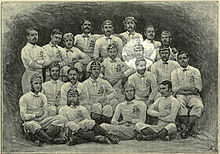Wanderers Football Club was an English association football club. It was founded as "Forest Football Club" in 1859 in Leytonstone. In 1864, it changed its name to "Wanderers", a reference to it never having a home stadium, instead playing at various locations in London and the surrounding area. Comprising mainly former pupils of the leading English public schools, Wanderers was one of the dominant teams in the early years of organised football and won the inaugural Football Association Challenge Cup in 1872. The club won the competition five times in total, including three in succession from 1876 to 1878, a feat which has been repeated only once.
James Frederick McLeod Prinsep was an English footballer who held two 'youngest player' records for almost 125 years, before they were both broken within the space of just over a year.
Clapham Rovers was from its foundation in 1869 a leading English sports organisation in the two dominant codes of football, association football and rugby union. It was a prominent club in the late 19th century but is now defunct. The club played variously on Clapham Common, Tooting Bec Common, and Wandsworth Common and wore a cerise and French-grey kit.

The 1876 FA Cup final was an association football match between Wanderers F.C. and Old Etonians F.C. on 11 March 1876 at Kennington Oval in London. It was the fifth final of the world's oldest football competition, the Football Association Challenge Cup. The Wanderers had won the Cup on two previous occasions. The Etonians were playing in their second consecutive final, having lost in the 1875 match after a replay. Both teams had conceded only one goal in the four rounds of the competition prior to the final. In the semi-finals, the Wanderers defeated the Swifts and the Etonians beat the 1874 Cup winners Oxford University.
The 1879 FA Cup final was contested by Old Etonians and Clapham Rovers at the Kennington Oval in London. Old Etonians won by 1–0, the only goal scored by Charles Clerke.

The 1882 FA Cup final was contested by Old Etonians and Blackburn Rovers at the Kennington Oval. Old Etonians won 1–0, the only goal scored, according to most reports, by William Anderson, although another, questionably, gives Reginald Macaulay. It was the last final to be won by one of the Southern "gentleman amateur" teams who had dominated the first decade of the competition.
Reginald Heber Macaulay was an amateur English footballer and merchant. He won the FA Cup with Old Etonians in 1882 and made one appearance for England in 1881 playing as a forward.
Robert Andrew Muter Macindoe Ogilvie was an English footballer who made one appearance as a defender for England in 1874, and was a member of the Clapham Rovers team that won the 1880 FA Cup Final.
Edgar Field was an English amateur footballer who helped Clapham Rovers win the FA Cup in 1880. He made two appearances for England as a full back.
Arthur John Stanley was an English sportsman and stockbroker. An association footballer, he was member of Clapham Rovers F.C., for whom he played as an outside-forward. He also played both singles and doubles tennis at Wimbledon.
Clopton Allen Lloyd-Jones was an English businessman and amateur sportsman, best known for football and cricket. He played for the Clapham Rovers when they won the FA Cup in 1880 and was selected, but did not play, for Wales as an international.

Henry John Cecil Turner was a rugby union international who represented England in 1871 in the first international match.
Herbert Whitfeld was an English amateur sportsman who played association football and county cricket.
Harry Chester Goodhart was an English amateur footballer who played as a forward in four FA Cup Finals for Old Etonians, before going on to become Professor of Humanity at the University of Edinburgh.
Charles John Clerke was an English amateur footballer who scored the only goal in the 1879 FA Cup Final.

Edgar Lubbock LLB was an English amateur footballer who twice won the FA Cup and played first-class cricket. He later became a partner in the Whitbread Brewery, a director and Deputy Governor of the Bank of England and the Master of the Blankney Foxhounds.
Edward Christian was an English amateur footballer who earned one cap for the national team against Scotland in 1879. He played in the full back position.
Louis Birkett was an English rugby union player who played for Clapham Rovers and was also selected to play for England. He was the younger brother of Reg Birkett and uncle of John Birkett.
Vincent Weston was an English footballer and rower from the late 19th century who won the FA Cup in 1880 as a half-back for Clapham Rovers.
Herbert Shelley Bevington was an English footballer who played for Clapham Rovers in the 1879 FA Cup final.





